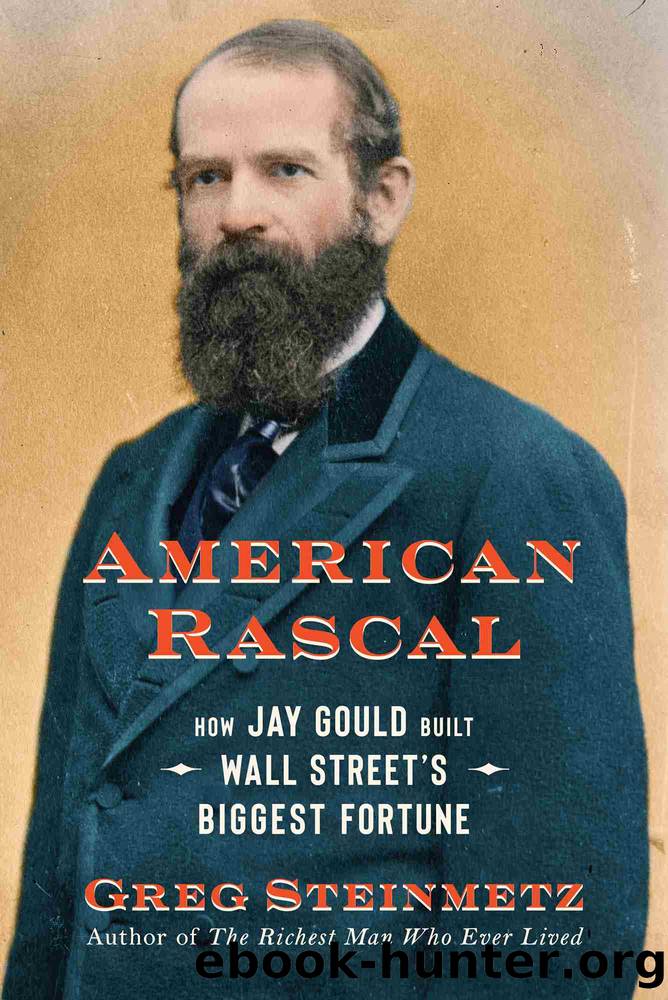American Rascal by Greg Steinmetz

Author:Greg Steinmetz
Language: eng
Format: epub
Publisher: Simon & Schuster
Published: 2022-08-30T00:00:00+00:00
The letter, dated November 26, 1872, was signed âC. Vanderbilt.â The Commodore hated Gould, and the idea that people would think he had partnered with Gould on a deal infuriated him. Not only had the Commodore lost some money to Gould, but Gould had accomplished something even more painful. He had embarrassed him. It was well known that Gould had outfoxed the Commodore by seizing Erie, by accelerating the Erie shareholder vote, and by successfully shorting New York Central with fake news.
There was also a little episode with the cows. Back when Gould ran Erie, Vanderbilt slashed New York Centralâs rates and offered to move cattle across New York State for the token amount of $1 a carload. Erie was pinched for cash. Vanderbilt was certain the move would bury the railroad and take Gould down with it. Instead, Gould and Fisk made a profit by buying cows in Chicago and shipping them to market at Vanderbiltâs bargain rates. âWhen the old Commodore found out he was carrying the cattle of his enemies at great expense to himself, he nearly lost his reason,â Gouldâs assistant Giovanni Morosini later recalled. âIt was very blue in Vanderbiltdom.â8
A reporter from the Sun caught up with Vanderbilt and queried his thoughts on Gould. âMay I ask you,â the reporter said, âif you have any especial reason for thinking ill of him?â
âI have had but one business transaction with him in my life. In July, 1868, I sold him some stock for which he paid me promptly,â Vanderbilt said, referring to the sale of his Erie shares.
âWhy then do you distrust him,â the reporter asked.
âHis face sir,â said Vanderbilt, as if it was obvious, âno man could have such a countenance and still be honest.â
The reporter wanted more. âBut surely Mr. Vanderbilt, you must have some other reason besides that for your opinion.â
âI tell you,â Vanderbilt said. âGod Almighty has stamped every manâs character upon his face. I read Mr. Gould like an open book the first time I saw him.â
The reporter paused, waiting for a zinger. âYou have my authority for stating that I consider Mr. Jay Gould a damned villain,â Vanderbilt said. âYou canât put it too strongly.â
Gould normally let insults pass. But Vanderbiltâs words stung. When the reporter sought a reply, Gould hit back. Vanderbilt, he said, was seventy-eight and envious of the young. âHe can no longer go around as he used to and attend to business, and he is feebly envious of those who can,â he said. âThere is a class of rising financiers whom the old hates. They are young, full of energy and possessed of modern knowledge and appliances to aid them in their business. The old Commodore is jealous of them.â
Gould predicted that he, Rockefeller, Carnegie, and others of his generation would have even more brilliant careers than Vanderbilt. âThese young businessmen are rising into financial power, which will exceed the old Commodore even in his palmiest days.â9
Download
This site does not store any files on its server. We only index and link to content provided by other sites. Please contact the content providers to delete copyright contents if any and email us, we'll remove relevant links or contents immediately.
Hit Refresh by Satya Nadella(9134)
When Breath Becomes Air by Paul Kalanithi(8447)
The Girl Without a Voice by Casey Watson(7889)
A Court of Wings and Ruin by Sarah J. Maas(7847)
Do No Harm Stories of Life, Death and Brain Surgery by Henry Marsh(6941)
Shoe Dog by Phil Knight(5268)
The Rules Do Not Apply by Ariel Levy(4969)
A Higher Loyalty: Truth, Lies, and Leadership by James Comey(4964)
Hunger by Roxane Gay(4928)
Tuesdays with Morrie by Mitch Albom(4784)
Everything Happens for a Reason by Kate Bowler(4743)
The Immortal Life of Henrietta Lacks by Rebecca Skloot(4588)
Millionaire: The Philanderer, Gambler, and Duelist Who Invented Modern Finance by Janet Gleeson(4478)
How to Change Your Mind by Michael Pollan(4357)
All Creatures Great and Small by James Herriot(4322)
The Money Culture by Michael Lewis(4207)
Man and His Symbols by Carl Gustav Jung(4137)
Elon Musk by Ashlee Vance(4127)
Tokyo Vice: An American Reporter on the Police Beat in Japan by Jake Adelstein(3996)
